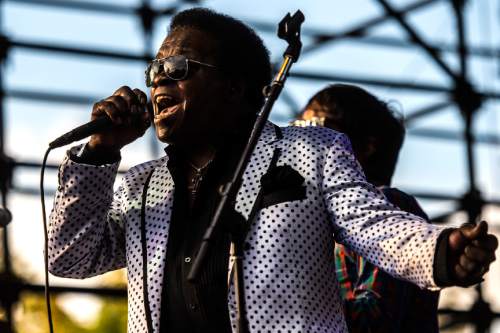This is an archived article that was published on sltrib.com in 2016, and information in the article may be outdated. It is provided only for personal research purposes and may not be reprinted.
Head-scratching by the Salt Lake City Council was the response to a request by Twilight Concert Series organizers for an extra $150,000 in emergency funding earlier this month so they could begin booking acts for the upcoming summer season.
The concert series has an annual budget of $1.6 million and plans to stage seven concerts this year.
The once-free Twilight has been incredibly popular. This year, as it heads into its 29th summer season, concert tickets are $5 in advance and $10 at the gate.
Last year, the independent, nonprofit Salt Lake City Arts Council, which oversees the series, sought $60,000 in emergency funding.
No one doubts that the concert series enlivens downtown Thursday evenings as crowds come and go from the Pioneer Park venue. And no one in City Hall has discussed ending it. But the council wants to ensure the good ship Twilight is not listing.
While the council agreed to fund the additional request in the upcoming 2016-17 budget, it also asked the Arts Council to bring back metrics regarding demographics of concertgoers and their impact on the general economy downtown.
The relationship between the city and the Arts Council is unusual. The council has an independent board, but its members are appointed by the city. The nonprofit has been funded through the municipality for decades.
The concert series came up again recently when Casey Jarman, who established Twilight and ran it for 27 seasons, sent an email to the City Council raising questions surrounding the $150,000 request.
"In the 27 years of running the Twilight Concert Series, we never came to the council for special funding," he wrote. "In fact, and this is important, my final year of directing the Twilight Concert Series, I left the Salt Lake City Arts Council with a $187,000 surplus of funds above expenses. By now, the series could and should be making money."
But Council Chairman James Rogers said Jarman's email isn't completely accurate.
During Jarman's years, Rogers said, the series did not carry liability insurance and did not reimburse the city for police and cleanup.
Now, Twilight bears those expenses. And as the recording industry has changed, performers have turned to concerts as their primary income.
"Twilight is not issue-free," Rogers said. "But it's part of what we're trying to do to activate night life."
Councilwoman Erin Mendenhall said the city needs a better understanding of Twilight's expenditures to ensure the series continues.
"It's a staple of the community," she said. "We don't want it to go away, but we must understand these shortfalls."
Karen Krieger, executive director of the Arts Council, said that although city funding has increased, the allocation has not kept pace with overall cost increases in artist fees, production fees and insurance costs, as well as public safety and cleanup.
Still, she embraced the council's request for metrics. Analyzing demographics of concertgoers and the series' overall impact on the economy, she said, will be good for the community as well as the Arts Council.









